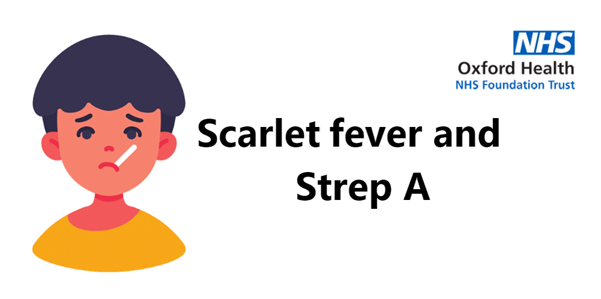Scarlet fever is usually a mild illness, but it is highly infectious. It is important to look out for symptoms in your child, which can include a sore throat, headache and fever along with a fine, pinkish or red body rash with a sandpapery feel. On darker skin, the rash can be more difficult to detect visually but will have a sandpapery feel.
Scarlet fever is caused by a bacteria called group A streptococci. These bacteria also cause other respiratory and skin infections such as strep throat and impetigo.
Getting help and advice if you have concerns
Contact NHS 111 or your GP if you suspect your child has scarlet fever, because early treatment with antibiotics is important to reduce the risk of complications such as pneumonia or a bloodstream infection. If your child has scarlet fever, keep them at home until at least 24 hours after the start of antibiotic treatments to avoid spreading the infection to others.
GP Out of Hours Services provided by the Trust are available for advice and support for anyone concerned about their health and needing advice and support that cannot wait until their own GP practice is open. The service can be contacted via NHS 111.
There is understandable concern amongst the public regarding the potential for serious illness associated with Strep A infections. This has resulted in a very significant demand for all Primary care services and has resulted in longer than average response times from the GP out of hours service.
If you are requiring advice and support, know that we are doing all we can to return your call in a timely manner. You can help by ensuring that your phone line is free and able to be answered promptly. Please do call the service back if your condition changes whilst waiting for a call though otherwise please bear with us whilst we do all we can to respond to those in greatest need.
What to look out for
There are lots of viruses around at the moment that cause sore throats, colds and coughs.
These should get better without medial intervention. However, sometimes children can develop a bacterial infection on top of a virus which can make them more unwell.
As a parent, if you feel that your child seems seriously unwell, you should trust your own judgement. Contact NHS 111 or your GP if:
- your child is getting worse
- your child is feeding or eating much less than normal
- your child has had a dry nappy for 12 hours or more or shows other signs of dehydration
- your baby is under 3 months and has a temperature of 38°C, or is older than 3 months and has a temperature of 39°C or higher
- your baby feels hotter than usual when you touch their back or chest, or feels sweaty
- your child is very tired or irritable
- if your child is aged 0-5 and you are concerned about your their health
Call 999 or go to A&E if:
- your child is having difficulty breathing – you may notice grunting noises or their tummy sucking under their ribs
- there are pauses when your child breathes
- your child’s skin, tongue or lips are blue
- your child is floppy and will not wake up or stay awake
Good hand and respiratory hygiene are important for stopping the spread of many bugs. By teaching your child how to wash their hands properly with soap for 20 seconds, using a tissue to catch coughs and sneezes, and keeping away from others when feeling unwell, they will be able to reduce the risk of picking up or spreading infections.
For more information:
https://www.gov.uk/government/news/ukhsa-update-on-scarlet-fever-and-invasive-group-a-strep
Published: 15 December 2022

